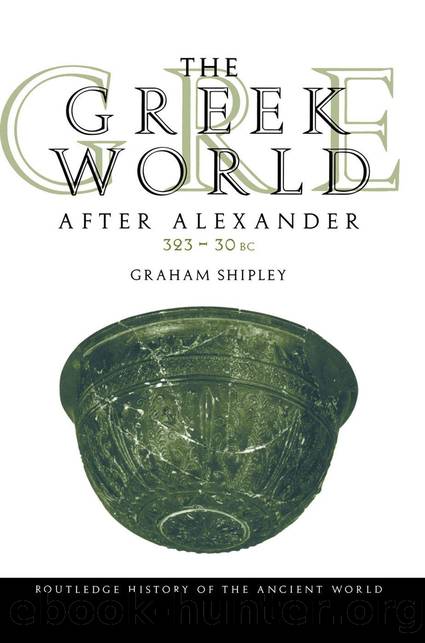The Greek World After Alexander 323â30 BC by Graham Shipley

Author:Graham Shipley
Language: eng
Format: epub
Publisher: Taylor and Francis
Published: 2000-01-15T00:00:00+00:00
Antiochos then went east (165â164) and restored Seleukid rule in Greater Armenia, which, like other eastern satrapies, had asserted its independence after 188. He tried to do the same in parts of Iran, but succumbed to a fatal illness. If his strategic aim was to hold up the Parthiansâ advance, it was at least temporarily achieved, and he may be accounted one of the more successful Seleukid kings.78
Methods of control
Unity versus regionalism
The Seleukids faced problems of geographical distance and ethnic diversity, of traditional and new power-centres; but they ruled with forceful ambition and exploited the resources of their empire with considerable success. In this section we shall see that they had learned from their Achaemenid predecessors to rule by means that did not involve the expensive over-use of force.
When Alexander defeated Dareios he took over the existing system of provinces ruled by satraps, usually Persian men though sometimes local nobles. Alexander appointed both Macedonians and occasionally Persians; Seleukos continued the practice.79 The Persian system had been designed to ensure the loyalty of a province â meaning, in effect, its ruling élite â as a reliable source of tribute and, when necessary, military manpower on the rare occasions of a major levy. The limited design meant that the Persians did not have to create a complex, interventionist administration; indeed, they seem to have had no aspirations to change the economy or society of a province, desiring to get out of it only what they wanted. The system, however, offered the satrap many opportunities to further his own power, even to the extent of refusing to pay the tribute and claiming independence. If this happened, a province could only be won back by military action on the part of the king, so a satrap might be able to avoid paying tribute for a long time. The best tactic for the king was to pick his satraps carefully and keep a close eye on them by having centrally appointed officers within the provincial palace.
Herodotos, in the fifth century, gives a useful indication of the governmentâs potential income when he records the amounts of tribute supposedly received by Dareios I in the late sixth century from each district of his empire (3. 89â95), and though we do not know whether the amounts are accurate, or whether they are the sums actually delivered, his account indicates which satrapies were seen as most important. Of areas that later formed part of Seleukid territory, the one paying the most was Babylonia-Assyria (1,000 talents of silver), followed by the Persian gulf (600), Cilicia (500), Media (450), and the Greek and neighbouring areas of western Asia Minor (400), though the whole of Asia Minor excluding Cilicia paid 1,060 talents. Phoenicia, Syria, Palestine, and Cyprus are listed as paying only 350 talents between them, but this may be because they provided warships; it may be, too, that in relation to the populations of these small areas their contributions were high. Interestingly, Baktria on its own paid 360, but the Parthians, Chorasmians, Sogdians, and Areians together only 300.
Download
This site does not store any files on its server. We only index and link to content provided by other sites. Please contact the content providers to delete copyright contents if any and email us, we'll remove relevant links or contents immediately.
The European Opportunity by Felipe Fernández-Armesto(569)
The European History Highway: A Guide to Internet Resources by Dennis A. Trinkle Scott A. Merriman(535)
Morgan Kaufmann Digital Watermarking and Steganography by Ingemar Cox Matthew Miller Jeffrey Bloom Jessica Fridrich Ton(528)
The Seven Wonders of the Ancient World by Michael Denis Higgins(520)
Hyperculture by Byung-Chul Han(509)
European Security in a Global Context by Thierry Tardy(505)
European Security without the Soviet Union by Stuart Croft Phil Williams(502)
The Routledge companion to Christian ethics by D. Stephen Long Rebekah L. Miles(498)
Get Real with Storytime by Julie Dietzel-Glair & Marianne Crandall Follis(443)
Hudud Al-'Alam 'The Regions of the World' - a Persian Geography 372 A.H. (982 AD) by V. V. Minorsky & C. E. Bosworth(436)
Gorbachev And His Generals by William C. Green(428)
Tibetan Studies in Comparative Perspective by Chih-yu Shih Yu-Wen Chen(427)
Governance, Growth and Global Leadership by Espen Moe(417)
How Languages Are Learned 5th Edition by Patsy M Lightbown;Nina Spada; & Nina Spada(406)
CliffsNotes on Fitzgerald's The Great Gatsby by Kate Maurer(399)
The Oxford History of the World by Fernández-Armesto Felipe;(388)
The Egyptian Economy, 1952-2000 by Khalid Ikram(379)
Oral Poetry and Narratives from Central Arabia: The Poetry of Ad-Dindan : A Bedouin Bard in Southern Najd (Studies in Arabic Literature, Vol 17) (English and Arabic Edition) by P. M. Kupershoek P. Marcel Kurpershoek(365)
The Oxford Handbook of the Incas by Sonia Alconini(364)
